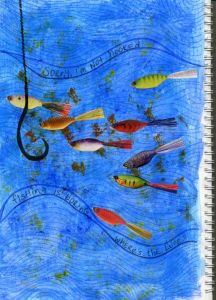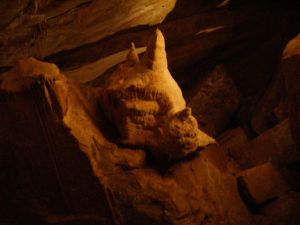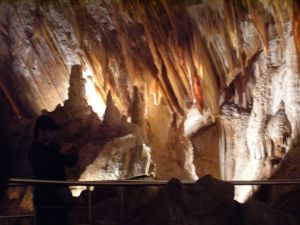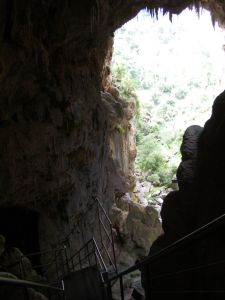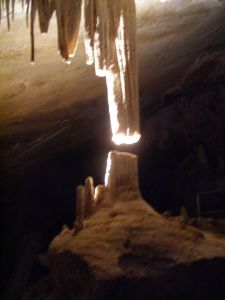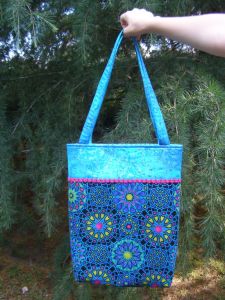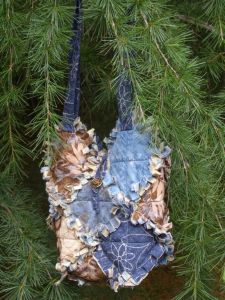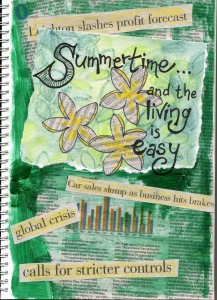So, you’re writing a novel or a script or whatever and you’d like to set your story somewhere exotic. Trouble is, you don’t know about anything beyond your own home town. What do you do?
1) You could try research. Libraries, internet, even TV documentaries or travel guides. Or you could talk to someone who’s been there, check out a few of their holiday snaps maybe.
2) You could write fantasy. You can make up whatever you like and nobody can tell you you’ve got it wrong (one of many reasons I like writing fantasy!)
3) You could be like the people responsible for the travesty of a movie the Carnivore watched on Friday night, and say your story’s set somewhere else but actually make it identical to your own home town.
It was called Supernova and was supposedly set in Sydney. I watched it for a while but couldn’t take it for long. I could put up with everyone speaking in American accents, but there was so much else that was so badly wrong it left me completely confused. I kept thinking the story must have switched to America and I’d somehow missed the part where the whole cast got on the plane.
It opened with a guy at a desert observatory. After a couple of minutes he got in his car, observed by two agents who had the place staked out, and drove to Sydney airport. One of the agents was an African American, which was out of place enough that it started alarm bells ringing. We have a multicultural society, with people from all over the place: lots and lots of Asians, Europeans of every kind, plenty of Middle Eastern people, quite a few Indians, Pacific Islanders, our own Aboriginals – but virtually no Africans. If you saw one on the street you’d look twice. But they popped up everywhere in this movie. At least half the extras were African Americans.
So the guy drives from the desert to the airport in an hour or so, when in fact it would take at least a day. Hell, some days you can’t even drive from the CBD to the airport in that time. His car is a left-hand drive and has Californian numberplates. In Australia we drive on the other side of the road and, strangely enough, our cars are registered in Australian states, not American ones.
It was all very confusing. A few minutes later another character was exploring an abandoned house at night. She was spooked by an animal in the house. A porcupine. Last time I looked we didn’t have any of those in Australia. Echidnas, yes. Porcupines, no.
I kept thinking I’d missed something at the airport scene. Surely we were now supposed to be in America? But no, people kept insisting it was Sydney. So why were they worrying about running out of “gas” when we call it “petrol”? Why did the children go to school on yellow school buses when children here catch regular commuter buses to school, which come in any colour the bus company chooses? Why were nervous housewives running around waving handguns when the house alarm went off when our gun control laws are so strict nobody but criminals and cops or gun enthusiasts have guns, which, if they’re legal, must be kept locked in a purpose-built cupboard at all times?
I gave up in disgust after about half an hour, but it left me perplexed. If you want to make a movie in America, go right ahead. But why pretend it’s set in Sydney? None of the reasons I could think of put the filmmakers in a good light.
1) They are so ignorant they have no idea that the rest of the world isn’t exactly like America.
I find this one hard to believe. Some parts of it must have been filmed in Sydney. There were shots of iconic Sydney landmarks being destroyed in the finale. So at least some of the people involved with the movie must have been here, in which case they must know at least some of the basic things they got wrong, like cars driving on the wrong side of the road, or Californian numberplates not being exactly that common outside America.
2) They believe their American viewers are so ignorant they have no idea the rest of the world isn’t exactly like America, so see no need to change anything.
This is pretty insulting to the American viewing public.
3) They believe their American viewers won’t notice all the mistakes, so there’s no point going to the expense of getting it right.
Possible, perhaps – except that it costs nothing to say “petrol” instead of “gas”, or to substitute a cricket bat or kitchen knife for a gun. But they couldn’t even be bothered doing that. Or do they think the American audience wouldn’t understand what was meant if characters said “petrol”? Again, pretty insulting to their viewers’ intelligence.
Which brings me back to the question: why bother insisting it’s Sydney if it’s demonstrably America in everything but name? Setting is made up of a myriad of details, probably the least important of which is the name. If I say my novel’s set in Paris, then there can’t just be the Eiffel Tower in the background. There’d better be people walking dogs everywhere, and the smell of fresh, crusty bread, cars parked haphazardly all over the footpath, a biting April wind and the sound of church bells. Otherwise no one who’s been there is going to believe me. Or worse, if everyone works from 9 to 5, just like they do in Sydney, with no mention of the looooong break in the middle of the day, people will ridicule me. That’s not how things work in Paris, so if I want people in my story to work 9 to 5 with a half-hour lunch break, I should set the damn story in Sydney. Or else get a clue and do my homework on Paris. It’s one place where the classic maxim “write what you know” has some merit. And if you don’t know, you’d better find out.
This is where writing fantasy is so much easier. Your world, your rules. As long as things are internally consistent, virtually anything goes. It’s like playing God. On the other hand, the fact that you can’t take anything for granted means more work. Every part of your society and world has to be considered. Characters can’t just hop on a train or drink a cup of coffee. You have to consider the level of technology and civilisation. How do people get around? What foods and beverages are available?
And do they have porcupines?





